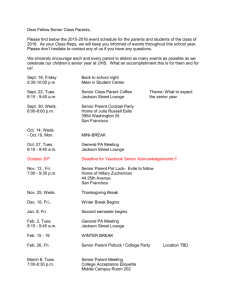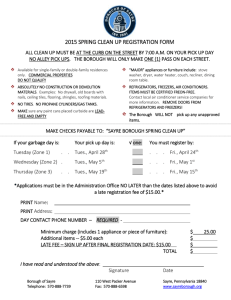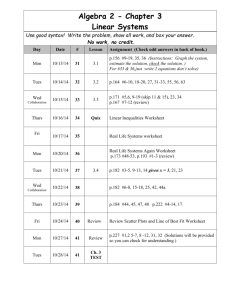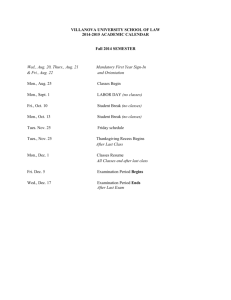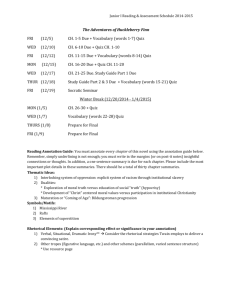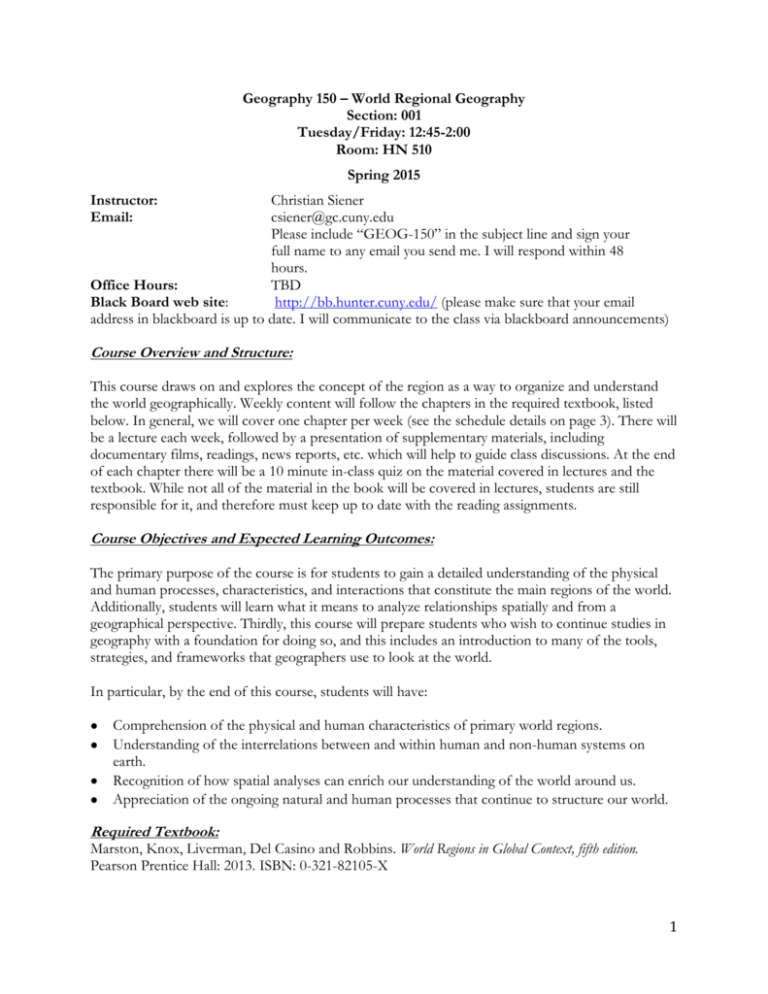
Geography 150 – World Regional Geography
Section: 001
Tuesday/Friday: 12:45-2:00
Room: HN 510
Spring 2015
Instructor:
Email:
Christian Siener
csiener@gc.cuny.edu
Please include “GEOG-150” in the subject line and sign your
full name to any email you send me. I will respond within 48
hours.
Office Hours:
TBD
Black Board web site:
http://bb.hunter.cuny.edu/ (please make sure that your email
address in blackboard is up to date. I will communicate to the class via blackboard announcements)
Course Overview and Structure:
This course draws on and explores the concept of the region as a way to organize and understand
the world geographically. Weekly content will follow the chapters in the required textbook, listed
below. In general, we will cover one chapter per week (see the schedule details on page 3). There will
be a lecture each week, followed by a presentation of supplementary materials, including
documentary films, readings, news reports, etc. which will help to guide class discussions. At the end
of each chapter there will be a 10 minute in-class quiz on the material covered in lectures and the
textbook. While not all of the material in the book will be covered in lectures, students are still
responsible for it, and therefore must keep up to date with the reading assignments.
Course Objectives and Expected Learning Outcomes:
The primary purpose of the course is for students to gain a detailed understanding of the physical
and human processes, characteristics, and interactions that constitute the main regions of the world.
Additionally, students will learn what it means to analyze relationships spatially and from a
geographical perspective. Thirdly, this course will prepare students who wish to continue studies in
geography with a foundation for doing so, and this includes an introduction to many of the tools,
strategies, and frameworks that geographers use to look at the world.
In particular, by the end of this course, students will have:
Comprehension of the physical and human characteristics of primary world regions.
Understanding of the interrelations between and within human and non-human systems on
earth.
Recognition of how spatial analyses can enrich our understanding of the world around us.
Appreciation of the ongoing natural and human processes that continue to structure our world.
Required Textbook:
Marston, Knox, Liverman, Del Casino and Robbins. World Regions in Global Context, fifth edition.
Pearson Prentice Hall: 2013. ISBN: 0-321-82105-X
1
Required text is available at Shakespeare and Company, the Hunter College Bookstore, or online.
Additional readings may be posted on Electronic Reserve on the library website.
Course Evaluation
Final grades for the course will be determined according to the following percentages. There will be
no extra credit assignments given in this course.
Quizzes: 20% (Based on top 10 scores out of 11 quizzes given)
Class attendance and participation: 15%
Midterm: 30%
Final Exam: 35% *** FINAL EXAM DATE/TIME: FRIDAY, MAY 22, 2015; 11:30 – 1:30 ***
If you are going to miss a test, you must notify me by email at least 48 hours before the test date
with sufficient documentation explaining your absence; failure to do so will result in a zero on the
exam.
I will not give any incompletes for this course unless there are exceptional and documented
individual circumstances.
Hunter College Policy on Academic Integrity
Hunter College regards acts of academic dishonesty (e.g., plagiarism, cheating on examinations,
obtaining unfair advantage, and falsification of records and official documents) as serious offenses
against the values of intellectual honesty. The College is committed to enforcing the CUNY Policy
on Academic Integrity and will pursue cases of academic dishonesty according to the Hunter College
Academic Integrity Procedures.
ADA Policy
In compliance with the American Disability Act of 1990 (ADA) and with Section 504 of the
Rehabilitation Act of 1973, Hunter College is committed to ensuring educational parity and
accommodations for all students with documented disabilities and/or medical conditions. It is
recommended that all students with documented disabilities (Emotional, Medical, Physical, and/or
Learning) consult the Office of AccessABILITY, located in Room E1214B, to secure necessary
academic accommodations. For further information and assistance, please call: (212) 772- 4857 or
(212) 650-3230.
2
Week-By-Week Schedule
Week
1
Dates
Fri, 1/30
Chapter 1: World Regions in a Global Context
2
Tues, 2/3
Fri, 2/6
Tues, 2/10
Fri, 2/13
Tues, 2/17
Fri, 2/20
Tues, 2/24
Fri, 2/27
Tues, 3/3
Fri, 3/6
Tues, 3/10
Fri, 3/13
Tues, 3/17
Fri, 3/20
Tues, 3/24
Fri, 3/27
Tues, 3/31
Fri, 4/3
Tues, 4/14
Fri, 4/17
Tues, 4/21
Fri, 4/24
Tues, 4/28
Fri, 5/1
Tues, 5/5
Fri, 5/8
Tues, 5/12
Fri, 5/15
World Regions (cont.)
World Regions (cont.) and chapter 1 quiz
Chapter 2: Europe
Europe (cont.) and chapter 2 quiz
Chapter 3: Russian Federation, Central Asia, Transcaucasus
Russian Fed (cont.) and chapter 3 quiz
Chapter 4: Middle East and North Africa
Middle East and North Africa (cont.) and chapter 4 quiz
Chapter 5: Sub-Saharan Africa
Sub-Saharan Africa (cont.)
Sub-Saharan Africa (cont.) and chapter 5 quiz
*** MIDTERM ***
Chapter 6: US and Canada
US and Canada (cont.) and chapter 6 quiz
Chapter 7: Latin America and the Caribbean
Latin America/Caribbean (cont.)
Latin America/Caribbean (cont.) and chapter 7 quiz
**NO CLASS--Spring Break**
Chapter 8: East Asia
East Asia (cont.)
East Asia (cont.) and chapter 8 quiz
Chapter 9: South Asia
South Asia (cont.) and chapter 9 quiz
Chapter 10: South East Asia
South East Asia (cont.) and chapter 10 quiz
Chapter 11: Oceania
Oceania (cont.) and chapter 11 quiz
Final Exam review
3
4
5
6
7
8
9
10
11
12
13
14
15
*** FINAL EXAM DATE/TIME: FRIDAY, MAY 22, 2015; 11:30 – 1:30 ***
3



